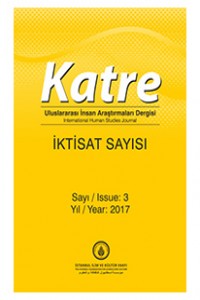Abstract
Riba (faiz) Kur’an’ın şiddetli yasaklarından biridir. Birçok ekonomik problemin altında faiz vardır. Said Nursi de birçok sosyal problemlerin başında “Ben tok olayım; başkası açlıktan ölse bana ne!” ve “Sen çalış, ben yiyeyim.” düşüncesinin olduğunu ifade etmektedir. Ona göre birinci düşünceyi ortadan kaldıracak olan unsur zekâtın farz olması, ikinci düşünceyi ortadan kaldıracak olan unsur da faizin haram kılınmasıdır. Zekât insanlar arasında yardımlaşmayı ve muhabbeti arttırır, faiz yasağı da zenginlerin ihtiyaç sahiplerini sömürmesini engeller.
Keywords
References
- Risale
Abstract
Usury is one of the strict prohibitions outlined in the Holy Qur’an. It lies at the root of many economic problems. Said Nursi also expressed the fact that the sentiments “I am full. If somebody else is very hungry, what has it got to do with me?” and “You work, I’ll eat” lie at the root of many social problems of our times. According to Nursi, the key to removing the first sentiment lies in the obligatory payment of Zakat (alms), and the key to removing the second sentiment lies in the prohibition of usury. The giving of zakat results in an increase in mutual assistance and affection amongst the people, while the prohibition of usury causes the rich to be prevented from exploding the needy and vulnerable members of society.
Keywords
References
- Risale
Details
| Primary Language | Turkish |
|---|---|
| Subjects | Religious Studies |
| Journal Section | Refereed Articles |
| Authors | |
| Publication Date | June 1, 2017 |
| Submission Date | June 1, 2017 |
| Published in Issue | Year 2017 Issue: 3 |

Katre International Human Studies Journal is open access journal under the CC BY-NC license (Creative Commons Attribution 4.0 International License)
Based on a work at https://dergipark.org.tr/en/pub/katre
E-mail: katre@iikv.org


